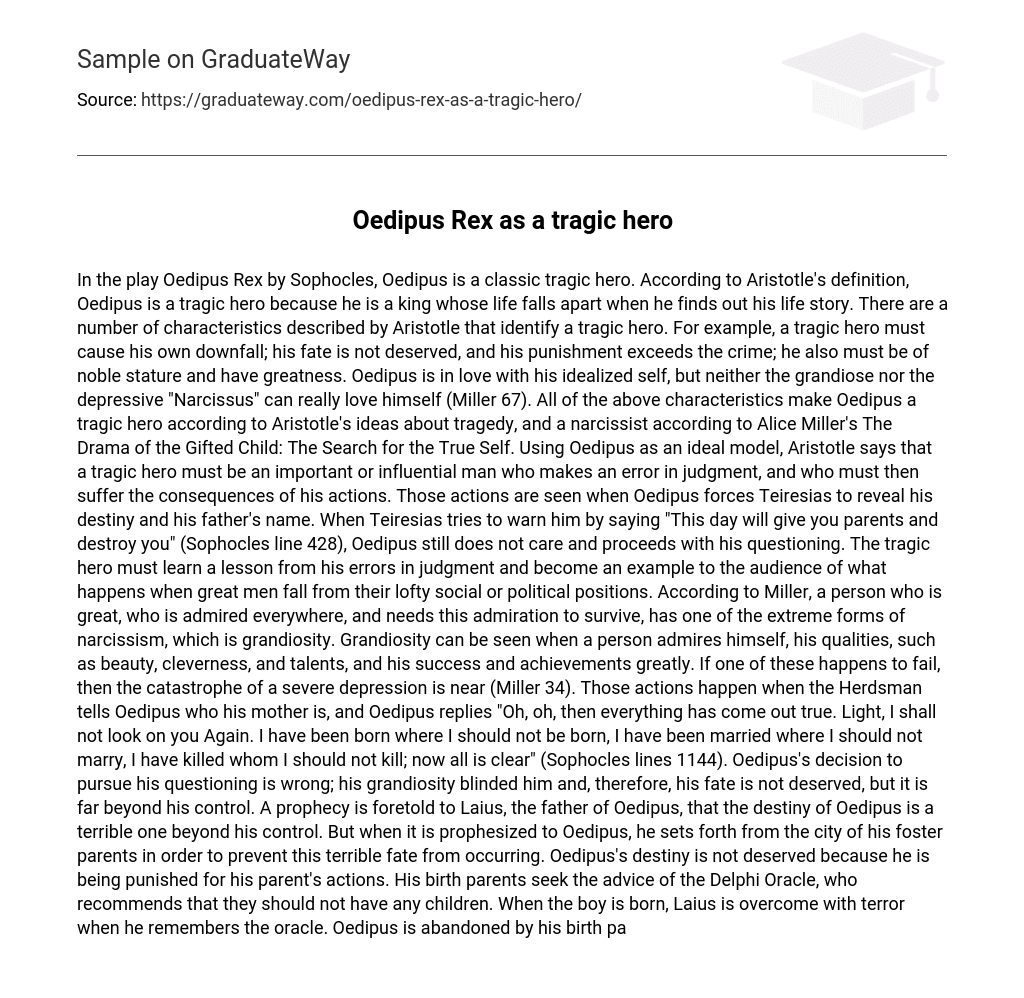In Sophocles’ play Oedipus Rex, Oedipus is considered a classic tragic hero in accordance with Aristotle’s definition. As a king, his life unravels when he discovers the truth about his own identity.
Aristotle and Alice Miller both describe the characteristics of a tragic hero. According to Aristotle, a tragic hero must bring about their own downfall, have an undeserved fate, receive a punishment that outweighs their crime, and possess nobility and greatness. In Miller’s perspective, Oedipus is infatuated with his idealized self, but neither the grandiose nor the depressive “Narcissus” can truly love themselves (Miller 67). Thus, Oedipus exhibits all the traits of a tragic hero according to Aristotle’s concept of tragedy and is a narcissist according to Miller’s book The Drama of the Gifted Child: The Search for the True Self. Aristotle asserts that a tragic hero, using Oedipus as an exemplary model, is a significant or influential person who makes a judgmental mistake and subsequently suffers the consequences. Oedipus’s actions demonstrate this when he forces Teiresias to disclose his destiny and his father’s identity.
Despite Teiresias’ warning that “This day will give you parents and destroy you” (Sophocles line 428), Oedipus remains indifferent and continues with his questioning. The tragic hero’s errors in judgment serve as a lesson and a cautionary tale for the audience, illustrating what can happen when esteemed individuals fall from their high social or political positions. According to Miller, individuals who are highly admired and rely on this admiration to sustain themselves often exhibit extreme forms of narcissism, such as grandiosity. Grandiosity manifests when a person greatly admires themselves, their qualities (such as beauty, intelligence, and talents), and their accomplishments. However, if any of these aspects were to fail, it can lead to a catastrophic depression (Miller 34). These actions occur when the Herdsman discloses Oedipus’s true mother to him, prompting Oedipus to exclaim, “Oh, oh, then everything has come out true.”
“Light, I shall not look on you again. I have been born where I should not be born, I have been married where I should not marry, I have killed whom I should not kill; now all is clear” (Sophocles lines 1144). Oedipus’s decision to continue his investigation is incorrect due to his arrogance and blindness, leading to an uncontrollable fate. Despite being raised by adoptive parents and leaving the city in an attempt to avoid this fate, Oedipus still faces undeserved punishment for the actions of his parents.
Oedipus’s defiance of destiny and determination to uncover the truth despite his arrogance and lack of vision ultimately result in an inevitable and unchangeable outcome. Laius, Oedipus’s biological father, was warned about the terrible fate that awaited him but could do nothing to prevent it. Even though Oedipus was brought up by different parents and tried to escape his foretold destiny by leaving the city behind, he is unjustly punished for the sins committed by his birth parents.
According to the text, Oedipus’ parents seek advice from the Delphi Oracle upon his birth. The oracle cautions them against having children. Nevertheless, Laius becomes anxious when reminded of this prediction and leaves Oedipus, thereby depriving him of affection from his biological parents. Arthur Miller labels this occurrence as “Depression as Denial of the Self,” indicating that depression emerges when we reject our own feelings. By denying the reality about our parents, caretakers, and ourselves, we are unable to genuinely feel love (Miller 43).
The tragic outcome of Oedipus’ life is predetermined by his noble birth. In tragedies, the main characters are often of noble status, heightening the impact of their downfall. Oedipus happens to be born into a royal family and succeeds in saving his rightful kingdom from the Sphinx. Despite his parents denying him his rightful noble stature at birth, this is later bestowed upon him by the Sphinx. However, this noble upbringing ultimately deceives Oedipus by not revealing his internal struggles, anguish, and personal history, as reflected in Miller’s words (66).
When he relies on his status, Oedipus is emotionally blind, unable to see the consequences of his actions. This self-inflicted blinding leads him to recognize his wrongdoing, realizing that his physical blindness is inconsequential compared to his emotional blindness. As he says, “What use are my eyes to me, who could never – See anything pleasant again?” (Sophocles line 1293). Additionally, Oedipus acknowledges that blindness can extend beyond the physical realm when he states, “If I had sight, I know not with what eyes I would have looked” (Sophocles line 1325). Through these statements, Sophocles portrays Oedipus as a well-intentioned but flawed character who lacks sound judgment.
According to Aristotle, Oedipus suffers greatly due to his tragic flaw and the fatal decisions he makes. It is believed that if Oedipus did not possess traits such as being judgmental or narcissistic, as characterized by Miller, he would not have killed King Laius or accused Teiresias of lying. Initially, Teiresias tries to gradually reveal the truth to Oedipus, but his pride prevents him from accepting any truths and he refuses to believe that he could have committed such a terrible crime. Ultimately, Oedipus learns an important lesson about life and realizes that it encompasses more than just an individual’s fate.





